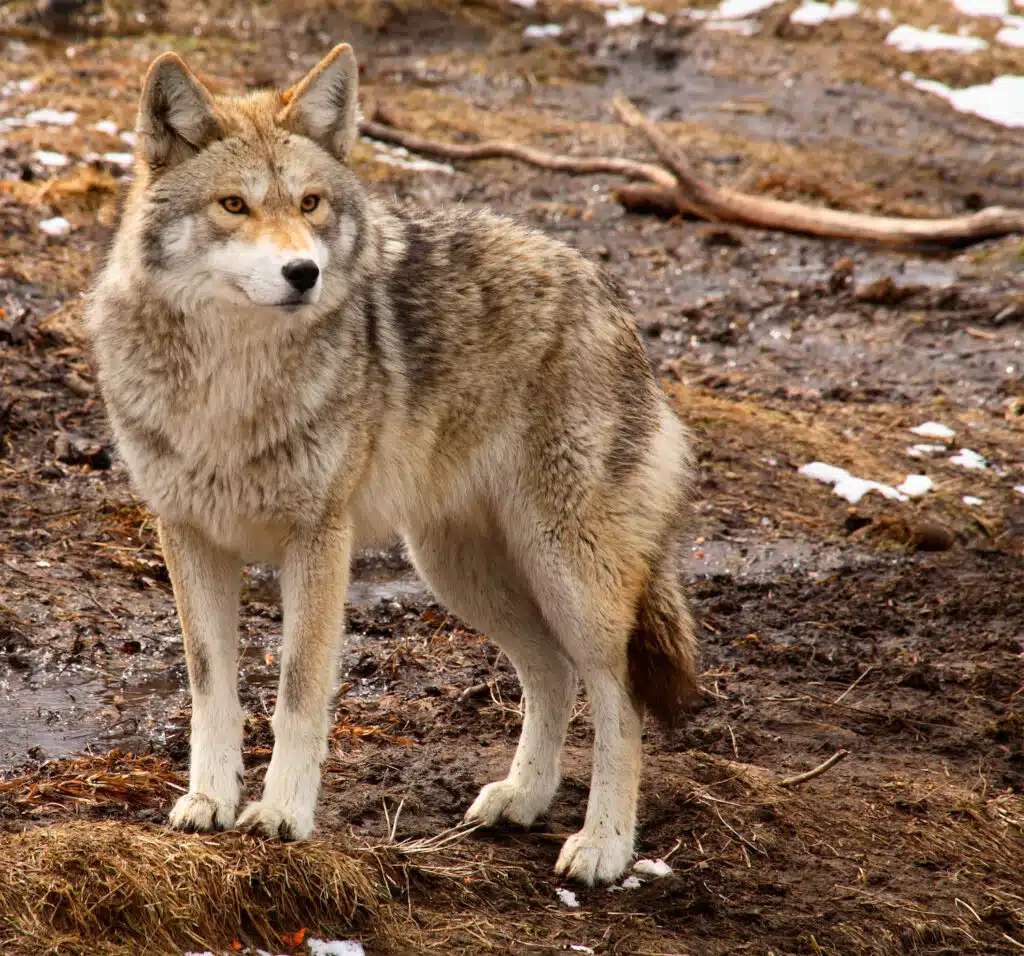There’s a growing concern about coyotes attacking humans in tents from people that love camping. Due to their booming population and shrinking natural habitat, coyotes cross paths with humans more frequently than ever before.
Previously confined to the deserts of North America and Mexico, coyotes are now present in 49 states, as well as across Canada. And coyote numbers continue to rise, despite around 400,000 trappings every year in the US alone.
Campers and hikers aren’t generally as cautious around coyotes as they would be bears, but is there reason to be fearful? And should you be worried about coyote attacks when camping in a tent? Let’s take a look.

Do coyotes attack people?
Coyote attacks are rare. Coyotes don’t target humans as prey and generally go after smaller critters like rabbits, rats, and reptiles. Coyotes have been known to attack larger prey like adult deer on occasion, but usually out of desperation.
However, there is reason to believe coyotes attacks, in general, are more common and that coyotes are becoming bolder. A research paper by the University of California’s Hopland Research and Extension Center examined the frequency of coyote attacks in Southern California.
They found there were over 48 verified coyote attacks between 1998 and 2004 compared to 41 attacks between 1988 to 1997. The paper highlights that these attacks were preceded by increasingly bold behavior, like stalking children near play areas or attacks on pets during daytime.
The research suggests the main reasons for this stark increase in attacks are coyotes relying on humans for food and increased interaction with humans.
While this research is over 15 years old, there’s no reason to believe coyote attacks have decreased since. In August 2021, Stanley Park in Vancouver, British Columbia, urged visitors to stay away due to over 40 reported coyote attacks in the space of nine months.
While this is a large number of attacks in the short space of time, it’s worth noting that there were only eight attacks in the previous 19 years in the region. The main reason for these recent attacks is because of overfamiliarity with humans due to excess trash and visitors hand-feeding coyotes.
Regardless of this evidence, coyote attacks are uncommon and caused by human behavior. Aggressive behavior towards humans is unusual, and coyotes will generally avoid humans as much as possible.
Attacks are more common on children and pets than adults due to their size. If you encounter coyotes that aren’t fearful of humans, report the incident to the local authorities.
Do coyotes attack tents?
There’s very little evidence to suggest coyotes attack humans in tents. Coyotes are unlikely to approach a hiker and are even less likely to try to get inside your tent.
However, YouTubers have recorded a few close encounters with coyotes while camping in tents.
One notable incident involved YouTuber Uncharted Travel while camping alone in an abandoned prison in Canada. In the middle of the night, a pack of coyotes began circling his tent, each time getting closer and bolder. Uncharted Travel attempted to scare off the coyotes with loud noises but to little effect.
At one point, a coyote was right up against the tent, growling loudly. Uncharted Travel was eventually forced to relocate his tent and barricade a door to avoid the coyotes until morning. There are several other YouTube clips with people claiming there are coyotes outside their tents, but none are as clear as Uncharted Travel’s video.
While these videos of coyote attacks are unnerving, they are incredibly rare, and there’s very little reason to fear coyotes while camping in a tent.
You may also be concerned about rabies causing aggression in coyotes, leading to attacks on tents. While coyotes carry rabies, they are less likely to be carriers than skunks, raccoons, bats, and foxes.
According to the Atlanta Coyote Project, coyotes account for 0.01% of rabies cases in Georgia. So, it’s unlikely a coyote will attack your tent due to rabies.
How do I identify a coyote?
Before your next camping adventure, it’s worth learning how to identify coyotes and how they differ from foxes, wolves, and dogs. Coyotes resemble medium-sized dogs but with bushier tails and pointed noses. Coyotes also keep their tails between their legs while they run, unlike wolves, foxes, and dogs.
Coyotes are smaller than wolves and have upright point ears rather than short and rounded ones. Wolves and coyotes have similar colorations; however, coyotes tend to have patches of white fur on the throat, chest, or belly.
The chances are you won’t get close to a coyote, so the easiest way to identify them is by their vocalizations. Coyotes have high-pitched cries, which can be unsettling, especially in the middle of the night.
Wolves have lower, drawn-out howls. Coyotes will also yip, yap, and bark.
How do I stop coyotes from attacking my tent?
While coyote attacks are very rare, they are becoming more likely, so it’s worth taking precautions while camping in a tent. It’s important never to feed coyotes or leave food unsealed around your camp.
Coyotes that take food from humans become less fearful, and the smell of food may attract coyotes and other wildlife. You should also ensure any trash cans are fully sealed as unsealed trash can attract coyotes.
You can also try pepper-spraying the tops of your trash cans to deter coyotes.
The scent of dogs and other pets can also attract coyotes. Dogs are especially at risk if they are under 25lbs or off-leash. Coyotes can also mate with unneutered dogs. Unspayed female dogs will attract coyotes, while males may wander off looking for a female coyote in heat. Neutering your dog will reduce the chances of attracting coyotes. (Here’s some important safety information for camping with dogs.)
Campfires are also good for repelling wildlife, including coyotes. Coyotes see best in low light, so a campfire may affect their vision and will likely put them off coming closer. That being said, a campfire may not ward off a hungry pack of coyotes.
If money’s no issue, you could try a high-tech solution like motion-sensing lights, which will alert you to the presence of coyotes as well as other wildlife.
If you hear coyotes nearby, the best way to keep them away is by making lots of loud noises. You can also try throwing sticks and stones if they come too close to your tent.
For more tent camping information, check out how to insulate a tent for winter camping.
You might also like trying these teepee tents, too.

Mike
Wednesday 29th of January 2025
Me and my dog which is boxer Samoyed male 2 years old at the time were aggressively attacked by a pack of 11 coyotes while in a tent in central Minnesota. They were obviously only interested in killing my dog. I fought them with a machete and hatchet while my dog was behind me in the tent. To this day I can show you the blood trail and remains of 5 coyotes I killed with machete.
Crodin
Thursday 18th of July 2024
A lot of coyotes are mixed with wolf now.
Canada James
Wednesday 15th of March 2023
Who in their wild-mind, is hand-feeding coyotes?!
My dog is under 20lbs. I like to let her off-leash. Only problem is she comes back with dead rabbit parts. Always within 100 feet of me. So there are obviously bigger predators in the area. Next time I go far-out, I am keeping her leashed mostly. There are now Coyote/Wolf hybrids where I live. Bigger and more aggressive.
Couch Potato Camping
Wednesday 15th of March 2023
Good idea. Yeah, that is concerning if she is bringing back things like that within 100 feet.
We know people who actually feed bears and raccoons on purpose. Then complain about wild animals being at their house and not leaving. Can't figure that one out.